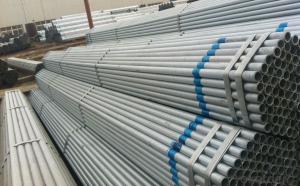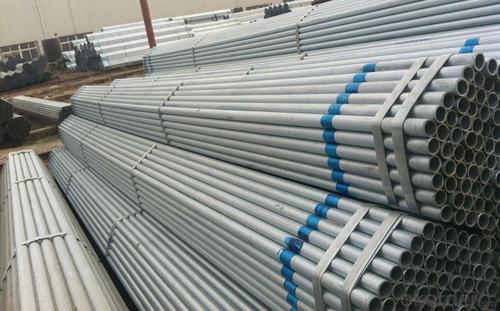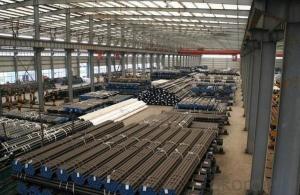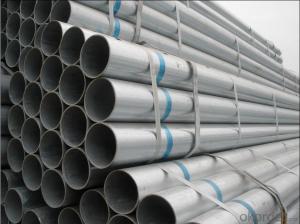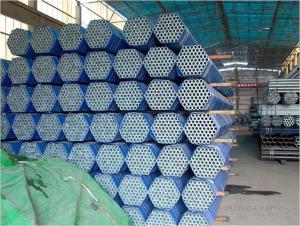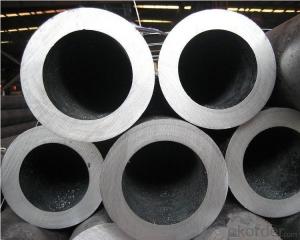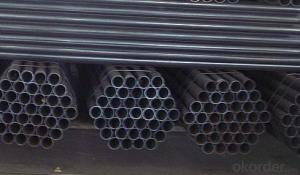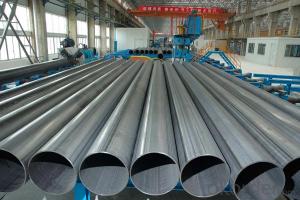Hot Galvanized Pipe For Building With BS 1387
- Loading Port:
- China Main Port
- Payment Terms:
- TT OR LC
- Min Order Qty:
- -
- Supply Capability:
- -
OKorder Service Pledge
OKorder Financial Service
You Might Also Like
O.D | O.D tolerance | W.T | Thickness Tolerance |
1/2-12'' | ±0.3mm | 1.5-12 MM | ±8% |
Length | 3m,4m,5.8m,6m or according customers' requirements | ||
Certificate | ISO9001-2008,EN10210,API,Raw material cert,Mill cert,Reap on site inspection report,SGS,BV | ||
Standard | ASTM A53/ASTM A36 BS1387/BS1139/EN39/EN10219/EN10217/EN10297/EN10296/EN10025 etc | ||
Material | Q195/215/235/345, SS330/400/500, S235JR/S235JQ/S235J2, etc | ||
Inspection | With Hydraulic Testing, Eddy Current , Infrared Test, etc | ||
Technique: | Welded Hot rolled,heat extrusion | ||
Packing | in bundle or in bulk, PVC in blue or in strip | ||
Usage | For construction, Pluid and Greenhouse | ||
Main market: | Middle east,North and South America, East and West Europe, South and southeast Asia,Australia,Africa, | ||
Place of Origin | China | ||
HS code: | 73063090 | ||
Productivity | 2000Ton/Month | ||
Processing | galvanzied,inner and outer stab clean,bevelled oiled,painted black threading,with coupling and plastic caps protected packing in plastic cloths,3PE,FBE,corrosion resistant coating | ||
- Q: How are steel pipes protected against galvanic corrosion?
- Steel pipes are protected against galvanic corrosion through the use of sacrificial anodes, coatings, or the application of electrical currents. These methods create a barrier or redirect the corrosion process, preventing the steel pipes from deteriorating due to galvanic reactions.
- Q: What are the safety considerations when working with steel pipes?
- When working with steel pipes, safety considerations include wearing appropriate personal protective equipment such as gloves, safety glasses, and steel-toed boots to prevent injuries. It is essential to handle and lift steel pipes using proper techniques and equipment to avoid strains and falls. Ensuring a clean and organized work area, as well as securing pipes to prevent rolling or tipping, reduces the risk of accidents. Additionally, workers should be cautious of sharp edges and ensure proper ventilation when working with welding or cutting tools to minimize the risk of fires or inhalation hazards.
- Q: How are steel pipes used in data centers?
- Steel pipes are commonly used in data centers for various purposes such as routing cables, running water cooling systems, and providing structural support for equipment. They are used to create a robust and organized network infrastructure, ensuring efficient and reliable data transmission and management within the facility.
- Q: What is the difference between steel pipes and FRP pipes?
- Steel pipes and FRP pipes are commonly used in various industries and applications, but they differ in several ways: 1. Material Composition: Steel pipes are constructed from iron and carbon alloys, along with elements like manganese, silicon, and small amounts of other metals. Conversely, FRP pipes consist of a polymer matrix reinforced with fibers such as glass or carbon. 2. Strength and Durability: Steel pipes are renowned for their exceptional strength and durability, enabling them to endure high pressures, heavy loads, and extreme temperatures. Although FRP pipes are also strong and durable, they are comparatively lighter in weight and may not possess the same level of strength as steel pipes. Nonetheless, they excel in corrosion resistance and have a longer lifespan in corrosive environments. 3. Corrosion Resistance: Steel pipes are susceptible to corrosion and thus require protective coatings or linings to prevent rust and deterioration. In contrast, FRP pipes possess inherent corrosion resistance and do not necessitate additional coatings. Consequently, they are well-suited for transporting corrosive fluids or functioning in corrosive environments. 4. Installation and Maintenance: Installing steel pipes necessitates specialized welding or threading techniques. Consequently, installation can be more labor-intensive and time-consuming, particularly for complex or large-scale projects. Conversely, FRP pipes are lightweight and easily transportable and installed. Often arriving in pre-fabricated sections, they expedite installation, reduce labor requirements, and demand minimal maintenance in comparison to steel pipes. 5. Cost: Generally, steel pipes are more expensive than FRP pipes due to the higher cost of raw materials and the need for additional corrosion protection measures. FRP pipes offer a cost-effective alternative, particularly in applications where corrosion resistance is paramount, as they eliminate the necessity for expensive coatings or linings. Ultimately, the selection between steel pipes and FRP pipes depends on the specific requirements of the application. Steel pipes are favored for their high strength, whereas FRP pipes offer advantages such as corrosion resistance, lightweight construction, and cost-effectiveness.
- Q: How are steel pipes used in the marine industry?
- Steel pipes are widely used in the marine industry for various applications such as shipbuilding, offshore structures, and underwater pipelines. They provide strength, durability, and corrosion resistance, making them suitable for transporting fluids, gases, and other materials in harsh marine environments. Steel pipes are also used for constructing piers, docks, and oil rigs, as well as for supporting and reinforcing marine structures.
- Q: How are steel pipes protected against fire?
- Steel pipes are typically protected against fire through the application of fire-resistant coatings or by encasing them in fire-rated materials, such as concrete or gypsum board. Additionally, fire sprinkler systems or fire-resistant insulation may be installed around the pipes to provide an added layer of protection.
- Q: How are steel pipes used in the manufacturing of telecommunications infrastructure?
- Steel pipes are commonly used in the manufacturing of telecommunications infrastructure for various purposes such as underground cable protection, overhead cable support, and antenna mounting. They provide durability, strength, and corrosion resistance, ensuring the longevity and reliability of the infrastructure. Additionally, steel pipes allow for easy installation and maintenance of telecommunications equipment, making them an essential component in the industry.
- Q: What are the different testing methods used for steel pipes?
- To ensure the quality and reliability of steel pipes, various testing methods are employed. These methods include: 1. Non-destructive Testing (NDT): Ultrasonic testing, magnetic particle inspection, and liquid penetrant testing are utilized in NDT to identify surface or subsurface defects in steel pipes without causing any damage. 2. Mechanical Testing: Mechanical testing encompasses various tests to evaluate the mechanical properties of steel pipes, such as tensile strength, yield strength, elongation, hardness, and impact resistance. These tests determine the structural integrity and performance of the pipes. 3. Hydrostatic Testing: This method involves subjecting steel pipes to high-pressure water to assess their ability to withstand expected operating conditions. The pipes are filled with water and pressurized to a predetermined level for a specified duration. Any leaks or deformations are detected during this test. 4. Dimensional Inspection: This testing method ensures that steel pipes meet specified dimensional requirements. It involves measuring critical dimensions such as diameter, wall thickness, and length to verify compliance with applicable standards. 5. Visual Inspection: Trained inspectors visually assess the external appearance of steel pipes using this basic method. They examine the pipes for surface defects such as cracks, corrosion, or irregularities in shape or finish. 6. Chemical Analysis: Chemical analysis is conducted to determine the composition and elemental content of steel pipes. It ensures that the pipes are made from the correct grade of steel and meet required chemical composition standards. 7. Metallographic Examination: Metallography involves examining the microstructure of steel pipes under a microscope to evaluate their quality and integrity. It helps identify internal defects like grain boundaries, inclusions, or improper heat treatment that may impact overall performance. By employing these testing methods, manufacturers and inspectors can guarantee that steel pipes meet necessary quality standards and are suitable for their intended applications.
- Q: What are the different types of coatings used on steel pipes?
- There are several different types of coatings used on steel pipes, including polyethylene, fusion bonded epoxy, coal tar enamel, and asphalt enamel. These coatings provide protection against corrosion, abrasion, and other forms of damage, ensuring the longevity and durability of the steel pipes.
- Q: How are steel pipes used in automotive manufacturing?
- Steel pipes are widely used in automotive manufacturing for various purposes. One of the primary applications of steel pipes in this industry is for the exhaust system. The exhaust system in vehicles is responsible for the safe removal of harmful gases produced during the combustion process. Steel pipes are used to create the exhaust manifold, which collects the exhaust gases from the engine cylinders and directs them towards the exhaust pipe. Furthermore, steel pipes are also used in the manufacturing of the chassis and frame of vehicles. The chassis provides structural support and helps maintain the overall strength and stability of the vehicle. Steel pipes, due to their high strength and durability, are ideal for creating the chassis and frame. These pipes are often welded together to form a rigid and robust structure that can withstand various forces and impacts. Additionally, steel pipes find applications in the suspension system of automobiles. The suspension system is responsible for providing a comfortable and smooth ride by absorbing shocks and vibrations. Steel pipes are used in the manufacturing of suspension components such as control arms, tie rods, and sway bars. These components help maintain the stability, handling, and overall performance of the vehicle. Moreover, steel pipes are utilized in the fuel system of automobiles. They are used to transport fuel from the fuel tank to the engine. These pipes need to be resistant to corrosion and have high tensile strength to ensure the safe and efficient delivery of fuel. In conclusion, steel pipes play a crucial role in automotive manufacturing. They are used in various applications such as the exhaust system, chassis and frame construction, suspension system, and fuel system. The use of steel pipes in these areas ensures the durability, strength, and performance of vehicles while maintaining safety and efficiency.
Send your message to us
Hot Galvanized Pipe For Building With BS 1387
- Loading Port:
- China Main Port
- Payment Terms:
- TT OR LC
- Min Order Qty:
- -
- Supply Capability:
- -
OKorder Service Pledge
OKorder Financial Service
Similar products
Hot products
Hot Searches
Related keywords
